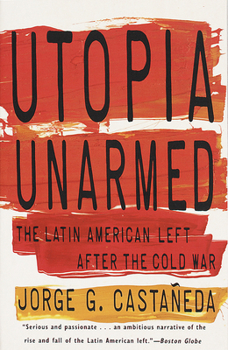Utopia Unarmed: The Latin American Left After the Cold War
Select Format
Select Condition 
Book Overview
Castro's Cuba is isolated; the guerrillas who once spread havoc through Uruguay and Argentina are dead, dispersed, or running for office as moderates. And in 1990, Nicaragua's Sandinistas were rejected at the polls by their own constituents. Are these symptoms of the fall of the Latin American left? Or are they merely temporary lulls in an ongoing revolution that may yet transform our hemisphere? This perceptive and richly eventful study by one of...
Format:Paperback
Language:English
ISBN:0679751416
ISBN13:9780679751410
Release Date:August 1994
Publisher:Knopf Doubleday Publishing Group
Length:512 Pages
Weight:0.96 lbs.
Dimensions:1.2" x 5.5" x 8.5"
Customer Reviews
2 ratings
Dated, but still very useful
Published by Thriftbooks.com User , 16 years ago
The best part of this book for me was the detailed analysis of the relationship between the Cuban Revolution and the rest of Latin America. The author is particularly good at explaining the differences in Cuban support to the various guerilla movements in the region during the 1970s and 1980s. The discussion of intellectuals in Latin America, especially their role in bridging the gap between the state and civil society, is also quite lucid. The suggestions for where the left should head now seem dated, given that the book was written more than a decade ago, but that does not diminish the overall quality of this author's scholarship. Simply stated, it is still one of the best histories of the Latin American left.
Historiography of left movements and progressive program
Published by Thriftbooks.com User , 27 years ago
This book was originaly written in 1992. An introduction added to account for important developments in 1994 that seem to contradict the main thesis. The book itself has 2 parts arifitially glued together. The first chapters present an excellent historiography of the last 60 years of left movements in Latin America. Parallels, connections and similarities are drawn between different groups in different times and places. All this is very informative, given the numerous references for further reading. One of the main arguments is that armed movements did not succeed in changing the politics of the region (except for a very small number of cases), that the transition to social-democracy activism is much more effective and that all of the democratically elected leftist governments failed to implement workable alternatives. The events in southern Mexico during January 94 contradict the general trend, hence the need for the new introduction. The last part of the book is programatic. Castaneda presents _the_ solution to the problems that plague the continent in the form of "recommendations" for the left (since the right will never do that). The program includes democratization, socially oriented government policies, regulated free-market, etc. As a whole the program is well presented and congruent. However, the apparent intent is to show how these policies are the only alternative based on the experience drawn from the first part of the book. On the last point I find the book lacking. The connection between the different historic cases and trens and the program for the future is not clear enough. Also, some internal contradictions are pointed out but not resolved (as to how the left will be elected with a corrupt polling process, etc)






